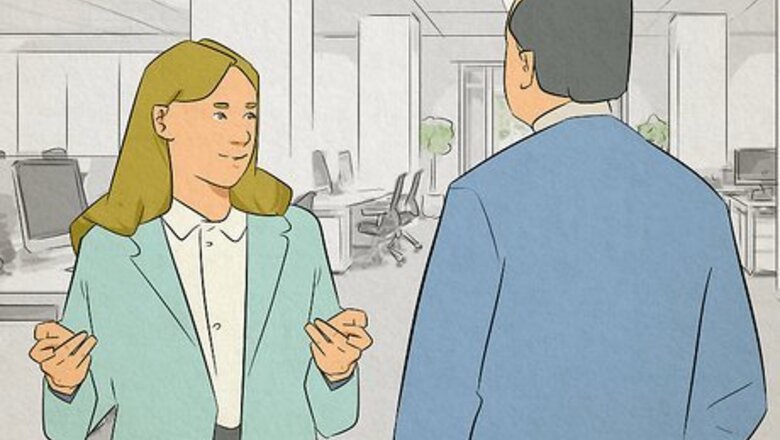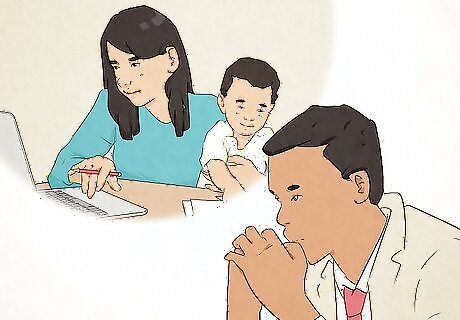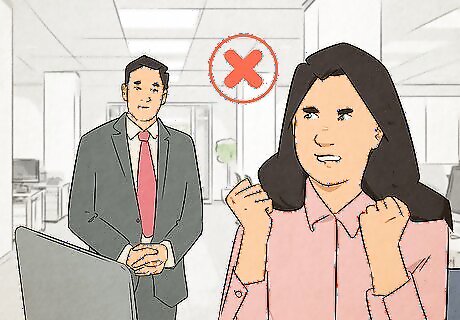
views
Hearing the Person Out

Let them lead in the conversation. It’s their apology, so let them take the lead. When your coworker pulls you aside to talk, hear them out completely. Resist the urge to interrupt what they’re saying. Let them get their entire message across before giving your response. Be aware of your non-verbal reactions, too. Avoid things like eye-rolling, scoffing, or other dismissive behavior, and keep eye contact. Act so that you can walk away knowing you handled the situation well, and with integrity.

Don’t brush off their guilt. There’s a tendency among victims to minimize the wrongdoing of the offender. This doesn’t help anyone, however. It lets the person off the “guilt” hook and protects you from dealing with conflict. Conflict is a healthy way to deal with disagreement and grow from an experience, so don’t act like you aren’t bothered just to keep the peace. Be especially mindful of this if you tend to avoid confrontations or are a “people pleaser.” Others may see it as permission to walk over you. Avoid comments like “It’s no big deal” or “Don’t worry about it.” Saying something like this is dismissive of your feelings, and the other person’s.

Listen for sincerity. Before you formulate a response to the person’s apology, evaluate the message. Was it heartfelt? Or, did it seem like the person was indifferent to what they’d done to you? Look into their eyes and question whether they truly feel sorry about their behavior. You can spot sincere apologies by looking for two key elements: the person seems to understand how it feels to be standing in your shoes and the person offers a solution to make amends. In a sincere apology, a person may also offer an explanation but will be clear that it doesn’t excuse their behavior.
Responding Graciously

Let them know how their behavior affected you. Before you let the person off the hook, be sure that they can understand the impact of their mistake. This approach may be slightly uncomfortable, but it helps assure that the person recognizes the consequences of their actions, making it less likely that they’ll do the same thing in the future. For instance, you might say, “I was really angry when you dropped your workload on my desk, especially since I knew you were only blowing off work to be with your boyfriend. I had to work three hours past shift to get everything finished.”

Verbalize your forgiveness. If you have assessed the apology for sincerity and expounded on how the person’s behavior affected you, then you can move on to verbally accepting the apology. Offer a brief and gracious reply. You might say something along the lines of “I know you didn’t mean to hurt me. I accept your apology” or “I understand why you may have made that decision. I’m ready to move on from it now.”

Thank them for apologizing. It takes a lot of courage to admit wrongdoing and ask someone for forgiveness. Give your coworker some credit for sticking their neck out by showing your appreciation. This doesn’t translate to being a kiss-up—they were in the wrong, after all—but it helps level the playing field and shows that you’re taking the high road. You might thank them by saying, “I really appreciate you coming to talk to me about this. Thanks.”

Keep the matter private. Another aspect of responding graciously is keeping the issue between the two of you. If you go blabbing to the rest of your coworkers about the person’s apology, your own acceptance of it seems to go out the window. Demonstrate that you are trying to maintain professionalism and starting off on a good foot by keeping your lips sealed about the matter. If you feel the need to vent, do it privately. Talk to someone outside of the office. You can also try writing your feelings down in a journal or a letter you won’t send. Take care not to dwell on the subject too long, though, as doing so will keep you from moving on.

Respond appropriately to an insincere or unsuitable apology. If you felt the person's apology was insincere, or if you simply cannot forgive them for their behavior, be straightforward about it. It will only make you look bad if you pretend to accept their apology but continue to lord it over them later. Let them know that, while you appreciate their apology, you cannot accept it. You might say, "Jordan, it says a lot that you came to me to apologize. But, I can't accept your apology" or "I appreciate your apology, but I'm afraid I can't accept it." You can also be clear about how you’d like the relationship to change. For example, you might say, “You know, I’d really prefer not to work on projects together in the future.” Or, “From now on, I’ll only be discussing professional matters with you.” Remember that you don't really owe the person an explanation. You can simply walk away.
Giving Them a Second Chance

Be empathetic. You can move forward from the situation by spending some time in the other person’s shoes. This can help you better understand why the person may have acted the way they did. When you can see their actions as “human” and not all that different from what you would have done, you are ready to move on. For example, maybe your coworker made a mistake in a report because she’s sleep-deprived due to juggling her job with caring for a newborn. In such a case, it’s hardly surprising that someone may make an error.

Work together to fix the problem. It’s great to foster a sense of teamwork when getting over a rift. The person may ask you how they can make amends. Use this opportunity to work together to resolve the situation and prevent it from happening again. Brainstorm possible methods for repairing the damage. For instance, you and your coworker might schedule a sit-down with the boss to explain their error and relieve you from solely taking the blame. Then, you might describe your plan for preventing future situations like this from reoccurring.

Don’t hold grudges. The worst thing you can do after accepting an apology is to hold the situation over your coworker’s head. If the person offered a sincere apology and tried to work with you to make amends, let the issue go. Avoid gossiping and complaining to colleagues about the person, too. It will make you look petty, even if you weren’t the instigator.

Keep your distance with repeat offenders. If your coworker is infamous for making mistakes and not taking ownership of their wrongdoing, use this situation as a lesson learned. Minimize contact with the person in the future to avoid being on the receiving end of their misconduct. This may also apply to situations when a coworker said something hurtful or vindictive about you behind your back but later apologized for it. Even if they seem sincere, you may want to keep your distance in the future. If you have trouble with a repeat offender, you can try talking to someone in Human Resources as a last resort. They can advise you on ways to resolve the situation and protect yourself.

















Comments
0 comment